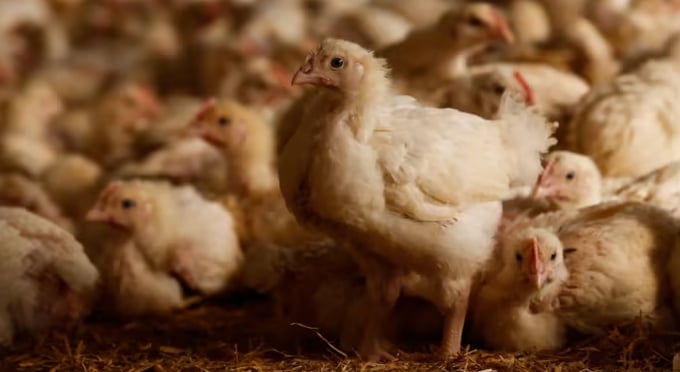November 27, 2025 | 08:11 GMT +7
November 27, 2025 | 08:11 GMT +7
Hotline: 0913.378.918
November 27, 2025 | 08:11 GMT +7
Hotline: 0913.378.918

Supermarkets have largely blamed the egg shortages on the avian flu outbreak, but farmers have been struggling with the high costs of energy and feed for months.
Remember lockdowns? When a highly infectious virus forced us indoors for months on end? Spare a thought — as you devour your scrambled eggs this weekend — for the chickens of England, cooped up and locked down by order of Defra, the poultry sector’s answer to Chris Whitty.
The environment and farming department imposed mandatory housing for all poultry and domesticated birds in England earlier this month to limit the worst outbreak of avian flu on record. The rampant epidemic has led to the death — mainly through culling — of 97mn birds globally, and 3.8mn in the UK, according to the World Organisation for Animal Health.
While some consumers have been swift to fret about what to serve instead of turkey this Christmas, the real debate this week has been the threat to our morning omelettes. This is perhaps unsurprising for a nation proud to go to work on an egg and now grappling with bigger questions about the future of free-range.
According to industry standards, for eggs to be categorised as free-range they must be laid by hens with continuous access to a chicken run and a cosy 15cm of perch of their own in a henhouse. In the case of a lockdown, birds with no access to the outdoors are still technically free-range for up to 16 weeks.
Daniel Crossley, of the Food Ethics Council, says the four-month allowance helps to avoid consumer confusion about the free-range label. “If we’re confident this is a one off, then it feels sensible to have that grace period,” he said. The difficulty comes when avian flu persists as it has done this year, rather than petering out during the summer months.
After four months, producers are required to label their products as “barn eggs”. Similar rules apply to other poultry products. OXO this week labelled batches of its free-range chicken stock, “temporarily made using non free-range stock”.
More noticeable than rogue labels were the dramatic egg shortages that hit supermarkets this week. Shoppers gaped at empty shelves while Twitter filled with helpful ideas for baking substitutes, and disconcerting methods for long-term egg storage (pickling lime, anyone?).
Branches of Asda limited customers to two boxes of eggs each, with a limit of three at Lidl, while Sainsbury’s caused consternation by importing Italian eggs. JD Wetherspoons took eggs off the menu on some breakfast options altogether, generously swapping in hash browns, onion rings or extra sausages.
Supermarkets have largely blamed all this on the avian flu outbreak, but angry chicken farmers have been quick to correct them. The industry has been struggling with rocketing energy and feed costs for months, and rising input costs including labour and packaging. Though supermarkets have raised their egg prices by approximately 45p since March, only 5-10p of this has been passed on.
The British Free Range Egg Producers Association said a third of its hen farmers had either reduced their flock sizes, paused production or left the industry altogether as a result of the cost pressures. “Failing to break even when you’re trying to look after livestock is a very depressing experience,” said Robert Gooch, the association’s chief executive.
The EU, meanwhile, is looking to scrap the 16-week limit, allowing farmers to categorise products as free-range indefinitely while avian flu persists. Gooch hopes the UK will follow suit.
Supermarkets will have to cough up to avoid further shortages, and eggs will be plentiful again — no doubt in time for the dreaded eggnog season. But the cost of living crisis isn’t a reason to neglect the UK’s essential food producers, just as avian flu is no justification for sacrificing animal welfare. For now, chickens will remain in lockdown. And consumers might start to ask more questions about where their eggs come from than how to hoard them.
(Finacial Times)

(VAN) A new study reveals how the simultaneous effects of ocean acidification, salinity and loss of oxygen are making the world more fragile.

(VAN) Hopes are growing that the creation of the first 3D turkey gut model could be a turning point in the battle against the virulent blackhead disease.

(VAN) Tyson, America’s biggest meat supplier, plans to shutter one of its largest beef processing plants as the industry continues to struggle with low cattle supplies and political pressure from Washington.

(VAN) New FAO study shows how digital solutions are empowering farmers and fishers to prevent losses and build resilient agrifood systems.

(VAN) Brazil's COP30 presidency pushed through a compromise climate deal on Saturday that would boost finance for poor nations coping with global warming but that omitted any mention of the fossil fuels driving it.

(VAN) Poultry farmers in the UK have been warned that they could face one of the worst winters yet for bird flu.

(VAN) Prices of main-crop paddy have risen sharply, with jasmine rice hitting 16,100 baht per tonne — the highest level in years.